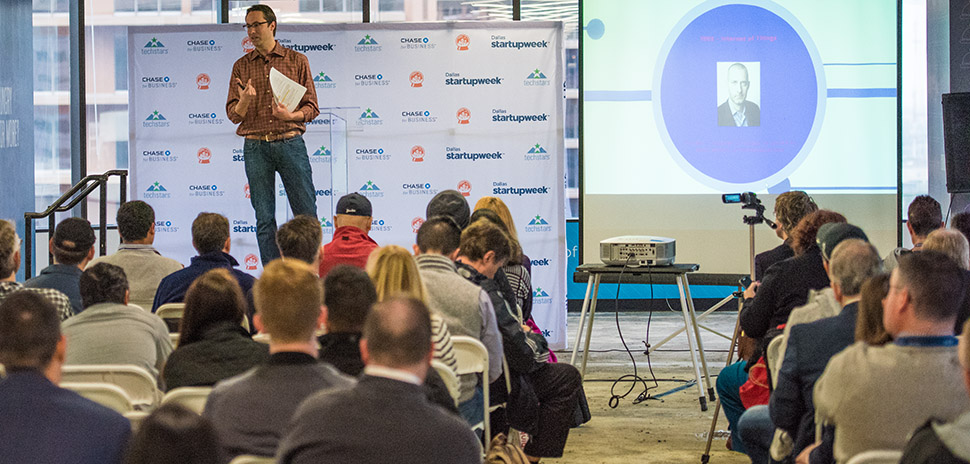The world could have more than 50 billion connected devices by 2020 — seven times the amount of people on Earth.
That’s everything from smart thermostats and appliances to autonomous vehicles and wearable devices.
But as Corey Egan, founder and CEO of Ilumi Solutions Inc, said, these popular Internet of Things devices are just the beginning.
Within two years, the IoT market could become a $11 trillion market comprising of new short-range bluetooth mesh, edge computing, and deep learning with much of it authenticated by blockchain ledgers zooming over ultra fast 5G cellular networks, Egan said.
“The Internet of Things is about to massively blow up … You guys have the opportunity to put the puzzle pieces together to create that future.”
Corey Egan
Egan’s Internet of Things keynote kicked off Dallas Startup Week Monday morning at Ross Tower with a bang, inspiring entrepreneurs to find a problem in the world and solve it with an IoT solution.
“The Internet of Things is about to massively blow up,” Egan said. “Don’t go into your pitch saying you’re going after an $11 trillion market. If you try to tackle the whole behemoth at once, unless you are extremely well funded, it’s probably going to be a challenge. You guys have the opportunity to put the puzzle pieces together to create that future.”
It could be a sensor, a network or software that analyzes the data — anything that makes the system work faster and more efficiently. While consumer goods get most of the headlines, the biggest potential will come from industrial applications. Egan started out doing smart lightbulbs.
“Now, our focus is shifted to those bluetooth mesh infrastructure solutions,” Egan said.
This futuristic phenomenon was first predicted as early as 1932 by Jay B. Nash, who wrote about mechanical slaves turning on lights automatically, controlling our thermostats and refrigerators and even driving our cars for us, Egan said.
“They practically eliminate time and space by the fleetness,” Nash wrote during the height of the Great Depression.

Ilumi Solutions founder and CEO Corey Egan [Photo: Michael Samples]
Now, in 2018, this world is reality.
Bluetooth mesh technology is becoming more powerful, with the next generation of devices having the ability to connect to multiple devices from as far away as 300 feet.
In the future, vehicles could connect to IoT devices as they approach the home, automatically opening the garage door, turning on lights and activating the thermostat, just as Nash predicted.
Having pervasive devices raises serious concerns, too.
There are even cases where hackers are using extra bandwidth on IoT devices to mine for cryptocurrency, Egan said.
“There’s billions of ways that someone can get to information that they aren’t supposed to,” Egan said. “There are many opportunities to prevent or inhibit access.”
EDGE COMPUTING COULD REVOLUTIONIZE AUTONOMOUS DRIVING
The future of edge computing could revolutionize autonomous driving by allowing certain processes and decisions to be made locally. An 8-hour drive produces 8 terabytes of data, far too much data to upload to the cloud, Egan said. The advantage of edge computing is that onboard processors make decisions, then upload critical data to the cloud.
“It doesn’t have to be the technology, it’s about identifying the problems.”
Corey Egan
The new AmazonGo stores are loaded with IoT technology with cameras and facial recognition software that snap photos of customers as they grab items in the store. Computer vision could revolutionize retail, especially considering Amazon purchased Whole Foods last year.
The solution could be something simple, like locally-based NoiseAware, a sound sensor that monitors for excessive partying noise at Airbnb homes.
“It doesn’t have to be the technology, it’s about identifying the problems,” Egan said.
READ NEXT
Dallas Startup Week 2018: Day 1 Roundup![]()
Get on the list.
Sign up to keep your eye on what’s new and next in Dallas-Fort Worth, every day.






























